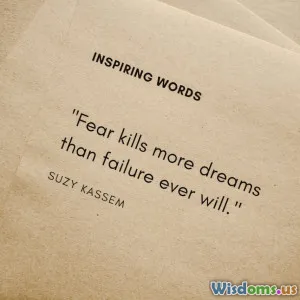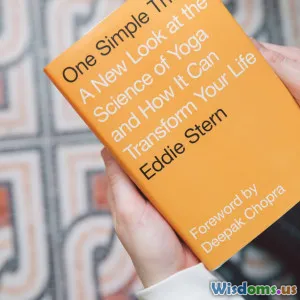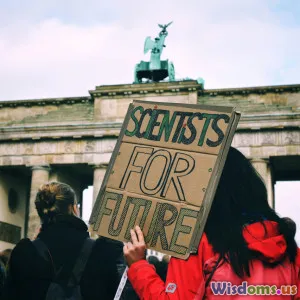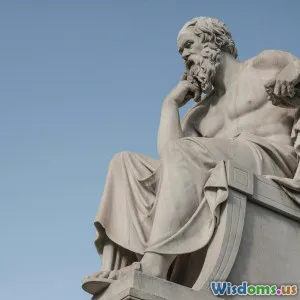
The Intersection of Science, Philosophy, and Faith
9 min read Explore the complex relationship between science, philosophy, and faith in understanding our existence. (0 Reviews)
The Intersection of Science, Philosophy, and Faith
Throughout history, humanity has been captivated by the intersection of science, philosophy, and faith. These three pillars of thought not only shape but also reflect our understanding of existence, morality, and the universe itself. In this article, we will unravel how these domains coexist, clash, and ultimately contribute to our search for knowledge and meaning in life.
The Early Days: When Rational Thought Began to Emerge
The roots of this intersection can be traced back to Ancient Greece, where thinkers like Socrates, Plato, and Aristotle began the exploration of metaphysical questions. They asked, “What is truth?” and “What is the essence of being?” Their inquiries laid the foundation for philosophy as a discipline. The aim was, and still is, to seek meaning beyond mere existence.
In parallel, the early scientific method was being developed, fundamentally altering how humans perceive the natural world. Figures such as Galileo Galilei and Isaac Newton pioneered approaches that relied on observation, experimentation, and reason rather than dogma.
For instance, Galileo challenged the geocentric view of the universe, arguing instead for heliocentrism. This methodical approach enabled humankind to better understand its place in the cosmos, yet it also posed challenges to established religious views.
The Divergence and Convergence of Perspectives
As science advanced, especially during the Enlightenment era, the relationship between these realms grew complex. Enlightenment thinkers emphasized reason and empiricism, stressing that knowledge should be based on observable phenomena, and often leading to skepticism of religious explanations. John Locke's philosophy endorsed empirical observation and experience precipitating evidence-based belief.
However, even as empirical science gathered momentum, philosophical questions remained deeply rooted in human consciousness. For instance, existentialist philosophers like Jean-Paul Sartre and Søren Kierkegaard grappled with concepts of faith and free will, pondering whether human beings intrinsically possess a connection to the divine or are bound to define their own existence without an inherent purpose.
Romantic movements, too, started to intertwine spirituality with naturalism, highlighting an internal sense that science and spirituality can coexist. Writings from the likes of Ralph Waldo Emerson and William James acknowledged the spiritual dimensions of human experience, paving a bridge between empirical thought and individual faith.
Key Thinkers Shaping the Discourse
In our contemporary understanding of this intersection, we find crucial contributions from various thinkers:
Albert Einstein
Einstein famously remarked, “Science without religion is lame, religion without science is blind.” This quote encapsulates the desire for an integrative approach where scientific exploration and spiritual inquiry go hand in hand. His theories on relativity revolutionized the concept of space and time, yet he maintained a deep sense of wonder about the universe, infusing his scientific musings with a spiritual quality.
Karl Popper
Karl Popper introduced the idea of falsifiability, emphasizing that for a theory to be scientific, it must be testable and refutable. This raised questions about metaphysical claims often associated with religious faith, demanding rational scrutiny that often leads to conflicts between scientific discourse and dogmatic beliefs.
Richard Dawkins and the New Atheism
The emergence of the “New Atheists” in the late 20th and early 21st centuries heralded a critical movement that juxtaposed empirical evidence against religious dogma, with figures like Richard Dawkins arguing strongly for a science-driven worldview. Surrounding this narrative, many have experienced alienation, particularly when traditional religious viewpoints lay claim to matters of morality and purpose.
The Role of Quantum Mechanics in Modern Thought
Quantum mechanics has reopened debates on the intersection of science and spirituality in profound ways. Many physicists and spiritual thinkers draw correlations between quantum phenomena and concepts of interconnectedness and non-locality, enticing discussions on the enigma of consciousness.
For instance, the observer effect in quantum theory raises philosophical questions about the nature of reality itself. Is the universe unchanged without an observer? This has led thinkers like physicist David Bohm and philosopher Jürgen Habermas to suggest that perhaps human perception plays a pivotal role in shaping reality, echoing age-old spiritual beliefs about the interconnectedness of existence.
Ethical Considerations in Science and Faith
Ethics represent a crucial area where science and faith collide. Consider bioethics—the intersection where medical science, ethical principles, and religious faith must align. Debates over stem cell research, genetic modification, and artificial intelligence often ignite discussions woven with scientific inquiry and spiritual beliefs.
The Case of Genetic Modification
Genetic modification (GM) has profound implications, and diverse beliefs among various faiths raise complex questions. Scientifically, modification can eradicate diseases, but religious and ethical beliefs oppose altering natural processes. For instance, in many Christian doctrines, altering God’s creation could be seen as hubris. Similarly, Islamic ethics stress preservation and natural laws which may contradict GM practices.
Personal Growth Through the Interplay
On a micro level, the interplay between science, philosophy, and faith can catalyze personal growth, leading to the development of a well-rounded worldview. Numerous personal narratives reflect their journeys that intertwine empirical findings, thoughtful philosophies, and a profound sense of spirituality.
For instance, when individuals grapple with existential questions like the nature of suffering or the purpose of life, integrating insights from various domains fosters a deeper understanding of their personal experiences. A practicing physicist with a rich philosophical background might find solace in understanding the chaos theory, relating it metaphorically to challenges in life, and drawing faith from the belief that wisdom can arise from turbulence.
Conclusion: Bridging the Divide
As we traverse the expansive landscape formed by the intersection of science, philosophy, and faith, it becomes apparent that these realms are not necessarily in opposition. Rather, through dialogue and mutual respect, they present an opportunity for rich exploration of human knowledge and experience. Each domain offers perspectives that contribute to the holistic understanding of existence—a collective journey that intertwines rational inquiry, ethical consideration, and spiritual questioning.
By embracing this intersection, society can work toward a more comprehensive understanding of life and reality, where scientific inquiry complements philosophical reflection and spiritual insight, guiding us in an audacious quest for deeper truths.
Rate the Post
User Reviews
Popular Posts




















